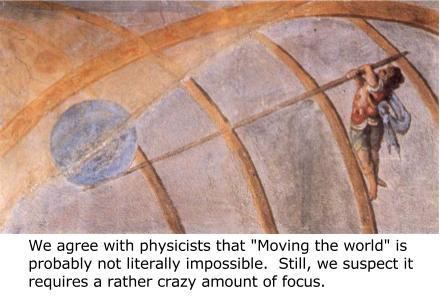A bit about our last few months:
- We’ve been working on getting a simple clear mission and an organization that actually works. We think of our goal as analogous to the transition that the old Singularity Institute underwent under Lukeprog (during which chaos was replaced by a simple, intelligible structure that made it easier to turn effort into forward motion).
- As part of that, we’ll need to find a way to be intelligible.
- This is the first of several blog posts aimed at causing our new form to be visible from outside. (If you're in the Bay Area, you can also come meet us at tonight's open house.) (We'll be talking more about the causes of this mission-change; the extent to which it is in fact a change, etc. in an upcoming post.)
-
We care a lot about AI Safety efforts in particular, and about otherwise increasing the odds that humanity reaches the stars.
-
Also, we[1] believe such efforts are bottlenecked more by our collective epistemology, than by the number of people who verbally endorse or act on "AI Safety", or any other "spreadable viewpoint" disconnected from its derivation.
-
Our aim is therefore to find ways of improving both individual thinking skill, and the modes of thinking and social fabric that allow people to think together. And to do this among the relatively small sets of people tackling existential risk.
Existential wins and AI safety
Who we’re focusing on, why
- AI and machine learning graduate students, researchers, project-managers, etc. who care; who can think; and who are interested in thinking better;
- Students and others affiliated with the “Effective Altruism” movement, who are looking to direct their careers in ways that can do the most good;
- Rationality geeks, who are interested in seriously working to understand how the heck thinking works when it works, and how to make it work even in domains as confusing as AI safety.
Brier-boosting, not Signal-boosting

- Further discussion of CFAR’s focus on AI safety, and the good things folks wanted from “cause neutrality”
- CFAR's mission statement (link post, linking to our website).
The catch-22 I would expect with CFAR's efforts is that anyone buying their services is already demonstrating a willingness to actually improve his/her rationality/epistemology, and is looking for effective tools to do so.
The bottleneck, however, is probably not the unavailability of such tools, but rather the introspectivity (or lack thereof) that results in a desire to actually pursue change, rather than simply virtue-signal the typical "I always try to learn from my mistakes and improve my thinking".
The latter mindset is the one most urgently needing actual improvements, but its bearers won't flock to CFAR unless it has gained acceptance as an institution with which you can virtue-signal (which can confer status). While some universities manage to walk that line (providing status affirmation while actually conferring knowledge), CFAR's mode of operation would optimally entail "virtue-signalling ML students in on one side", "rationality-improved ML students out on the other side", which is a hard sell, since signalling an improvement in rationality will always be cheaper than the real thing (as it is quite non-obvious to tell the difference for the uninitiated).
What remains is helping those who have already taken that most important step of effective self-reflection and are looking for further improvement. A laudable service to the community, but probably far from changing general attitudes in the field.
Taking off the black hat, I don't have a solution to this perceived conundrum.
The self-help industry (as well as, say, gyms or fat farms) mostly sells what I'd call "willpower assists" -- motivation and/or structure which will push you to do what you want to do but lack sufficient willpower for.